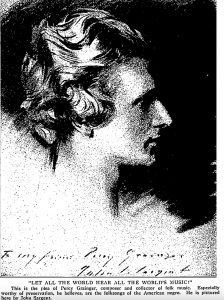Australian-born composer Percy Grainger had just moved to the United States in 1915 when an editorial article on Black American folk musics was published in Current Opinion, a quarterly magazine focused on literature and current issues, extensively citing Grainger as “a recognized authority on folk music.”1 The author’s reasoning for bestowing the title of “authority” was that much of Grainger’s career as a composer was characterized by his extensive use of folk music, particularly British folk tunes, in his works. The article goes on to recount many of Grainger’s opinions on Black American music and musicians, which generally attempt to characterize him as a champion of the marginalized. The caption under his portrait states that Grainger believes that “Especially worthy of preservation… are the folksongs of the American negro [sic].” In 1915, the readers of Current Opinion would’ve likely agreed with this characterization, but several sentiments expressed by the author as well as in Grainger’s quoted statements leap out as problematic to today’s reader.
The author, who remains unnamed by the publication, begins the article by comparing African-American folk tradition to folk traditions from the British Isles, stating that many scholars have “arrived at the conclusion that the origin of the music of the colored [sic] race in America was in the British Isles.”2 This statement of the prevailing opinion credits white colonizers with the musical traditions of Black Americans, drawing a racialized line through music in the United States, and then continuing to delegitimize the music attributed to Black Americans as simply imitations of White3 European folk musics. From here, the author seems to try to assert that Grainger rejects the idea that the Black American tradition is somehow lesser than, and is rather interested in preserving all folk musics, regardless of origin. The author mentions Grainger’s telling of a story about a British composer, Frederick Delius, whose music was influenced by the work songs he heard running his father’s plantation in Florida. Grainger seems here to be championing the influence of Black American music on the predominantly White world of classical music. However, the author then goes on to quote Grainger’s description of his theory of three steps in the development of music.
To Grainger, the first step is “traditional old songs and melodies of the people,” also referred to as folk music. Next, there is a transition from the folk to the “vaudeville,” or popular music that serves the sole purpose of entertainment. Lastly, there is the transition into the world of classical music, which Grainger refers to as the “‘world game.’” Again, Grainger has fallen into the trap of the prevailing race divide in music that still persists to this day. In this three-step theory, he posits Western classical music to be a universal ideal of music expression, the eventual evolution of all musics, regardless of cultural origin. As well, by asserting that Black Americans are behind White Americans and Europeans in their development of music expression, Grainger again devalues Black American music in his attempt to advocate for the preservation of Black American folk music as a legitimate genre of music.
Broadly, the Current Opinion article on Grainger’s perspectives of Black American folk music, despite some evidence of good intentions of preservation and legitimization, ultimately advocates for the assimilation of Black Americans into a Western musical culture that both the author and Grainger believe to be superior. This sentiment is not unusual for the time, as all non-Western musics were largely considered to be primitive, and this prevailed in early ethnomusicological study by scholars such as Frances Densmore. It is also expected of Grainger, as private correspondences reveal that was an advocate for “milder theories of eugenics,” and “Nordic racial (and artistic) superiority.” It’s crucial to understand how these opinions prevailed in the late 19th and early 20th centuries, not just within the academy regarding study of musics outside of the Western classical tradition, but among leading composers and performers, as well as the general populace. Recognizing past structural flaws and how they came about allows current and future musicologists to deconstruct the racialized structures and Eurocentrism in the study of music.
Notes
1“PERCY GRAINGER’S TRIBUTE TO THE MUSIC OF THE AMERICAN NEGRO.” Current Opinion (1913-1925) OL. LIX., (08, 1915): 100. https://www.proquest.com/magazines/percy-graingers-tribute-music-american-negro/docview/124777222/se-2.
2 Ibid.
3 I capitalize White when referring to it as a race, as other race categories are also usually capitalized (i.e. Black, Hispanic, Asian, etc.). I believe the lowercase spelling reinforces Whiteness as the default race.
4 Ibid.
5 Ibid.
6 Ibid.
7 Gillies, Malcolm, and David Pear. “Grainger, (George) Percy.” Grove Music Online. 2001; Accessed 21 Sep. 2023. https://www.oxfordmusiconline.com/grovemusic/view/10.1093/gmo/9781561592630.001.0001/omo-9781561592630-e-0000011596.

